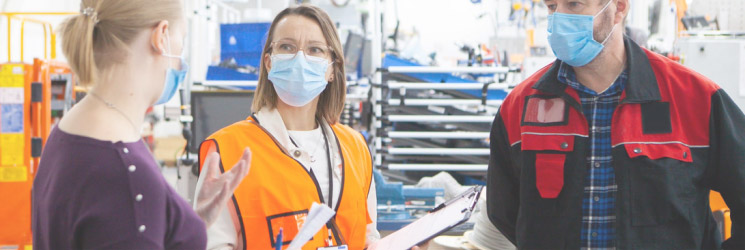

About us
Exercise of competence
The Occupational Safety and Health Inspector monitors the employer's compliance with the issued written advice and improvement notices in order to correct deficiencies in the workplace that violate labour legislation. If the inspector finds that the employer or other obligated party does not take the necessary measures or the matter cannot be delayed due to its nature, the inspector will refer the matter to the occupational safety and health authority.
Processing by occupational safety and health authorities means that Occupational Safety and Health Department at the Finnish Supervisory Agency will consider whether further measures are necessary. An employer can be obligated to correct shortcomings that cannot be considered minor with a legally obligating decision or by imposing a prohibition on the use of a machine or equipment. It is possible for the occupational safety and health authority to issue a negligence fee for certain cases of negligence concerning the contractor's liability and the posting of workers.
In certain situations, the police may also be notified of shortcomings observed in the workplace.
The table describes the exercise of competence in 2024:
| Means for exercising competence | Number |
|---|---|
| Obligating decisions | 255 |
Prohibition notices confirmed by the OSH authority |
22 |
| Negligence fees for contractor liability | 93 |
| Negligence fees related to posted workers | 69 |
| Investigation requests to the police | 398 |
| Statement to police/prosecutor | 666 |
Obligating decision
If the improvement notice issued by the inspector is not complied with, the occupational safety and health authority shall adopt a decision that obliges the employer or other party subject to the obligation to correct the condition of non-compliance within a specified time limit. A conditional fine, a notice of termination or a notice of suspension may be imposed to enforce the obligation.
The aim is that compliance with the obligation will help in attaining the minimum requirements laid down in legislation. The employer can choose how to what steps to take to meet the obligation. After the deadline, the occupational safety and health authority monitors compliance with the decision.
The employer or other obligated party as well as any other interested party will be reserved the opportunity to be heard in the matter. In addition, the occupational safety and health officer will be reserved the opportunity to be heard. This decision may be appealed to the Administrative Court.
Prohibition notices
The occupational safety and health authority may prohibit the use of machinery, work equipment or other technical equipment, a product or a work method until the unlawful condition has been rectified. The prohibition can be enforced with a conditional fine.
Before imposing a prohibition, the occupational safety and health authority consults the parties concerned and the occupational safety and health officer. The decision can be appealed to the Administrative Court.
Negligence fee
The occupational safety and health authority may impose a negligence fee for certain omissions concerning the obligations laid down in the Act on the Contractor's Obligations and Liability when Work is Contracted Out and the Act on Posting Workers. A negligence fee may also be imposed if the employer fails to submit a local agreement to the occupational safety and health authority that they are obliged to submit under the Employment Contracts Act.
As a rule, the imposition of a negligence fee requires that the party concerned be given an opportunity to be heard before a decision is made. A payment decision can be appealed to the Administrative Court.
Criminal matters
In criminal matters, the occupational safety and health authority acts in close cooperation with the police and the prosecutor. For example, an occupational safety and health authority may notify the police of any unlawful activities observed during an occupational safety and health inspection or issue a statement to the prosecutor on the basis of pre-trial investigation data.
If the employer is suspected of having committed a serious employment offence punishable under the Act enforced by occupational safety and health authorities or the Criminal Code, a report will be submitted to the police on the activities observed at the workplace. In the Criminal Code, the most serious offences include occupational safety offences, working hours offences, discrimination at work, extortionate discrimination at work and the use of unauthorised foreign labour.
The administrative measures of the occupational safety and health authority focus on the future. The assessment of criminal sanctions, on the other hand, focuses on the past, in other words, evaluating negligence that has already occurred. Administrative and criminal processes are not mutually exclusive, and both can be pending at the same time.

